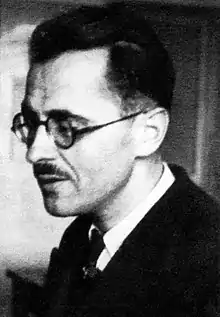
Émile Gagnan (1900 – 1984) was a French engineer and, in 1943, co-inventor with French Navy diver Jacques-Yves Cousteau of the Aqua-Lung, the diving regulator (a.k.a. demand-valve) used for the first Scuba equipment.[1] The demand-valve, or regulator, was designed for regulating gas in gas-generator engines, but was found to be excellent for regulating air-supply under varied pressure conditions. This allowed people to explore the ocean more easily, even though the original purpose was different.[2]
Gagnan was born in the French province of Burgundy in November 1900, and graduated from technical school in the early 1920s. He was employed as an engineer specializing in high-pressure pneumatic design by the large gas-supply firm Air Liquide. The first production 'Scaphandre Autonome' - or 'Aqualung' was released in France in 1946 under the identification code "CG45" ("C" for Cousteau, "G" for Gagnan and "45" for 1945, year of the patent).
A year later, in 1947, Émile Gagnan and his family emigrated to Montreal, Quebec, Canada and he transferred to the employ of Canadian Liquid Air Ltd. There he set up a lab and proceeded to engineer, design, prototype and patent a very large number of SCUBA and undersea technology firsts, including the direct ancestors of virtually every type of Scuba regulator in common use today.[3]
References
- ↑ "Gagnan n'est plus". BAnQ numérique (in French). La presse. 16 May 1984. Retrieved 20 November 2020.
- ↑ "Jacques Cousteau Centennial: What He Did, Why He Matters". news.nationalgeographic.com. Archived from the original on June 14, 2010. Retrieved 2016-03-02.
- ↑ "Emile Gagnan and Jacques Cousteau: Aqua-lung". Lemelson-MIT Program. Retrieved 2018-04-09.